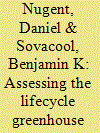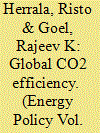|
|
|
Sort Order |
|
|
|
Items / Page
|
|
|
|
|
|
|
| Srl | Item |
| 1 |
ID:
127211


|
|
|
|
|
| Publication |
2014.
|
| Summary/Abstract |
This paper critically screens 153 lifecycle studies covering a broad range of wind and solar photovoltaic (PV) electricity generation technologies to identify 41 of the most relevant, recent, rigorous, original, and complete assessments so that the dynamics of their greenhouse gas (GHG) emissions profiles can be determined. When viewed in a holistic manner, including initial materials extraction, manufacturing, use and disposal/decommissioning, these 41 studies show that both wind and solar systems are directly tied to and responsible for GHG emissions. They are thus not actually emissions free technologies. Moreover, by spotlighting the lifecycle stages and physical characteristics of these technologies that are most responsible for emissions, improvements can be made to lower their carbon footprint. As such, through in-depth examination of the results of these studies and the variations therein, this article uncovers best practices in wind and solar design and deployment that can better inform climate change mitigation efforts in the electricity sector.
|
|
|
|
|
|
|
|
|
|
|
|
|
|
|
|
| 2 |
ID:
130300


|
|
|
|
|
| Publication |
2014.
|
| Summary/Abstract |
Genetically engineered (GE) foods apply new molecular technologies to agriculture. Widely adopted in the United States, Brazil and Argentina for the production of cons, soybeans, and cotton, they are practically banned in Europe and tightly regulated throughout the world. We have found that GE foods have significantly increase supplies cons, soybeans, and cotton, and lowered their prices, Thus improving food security, GE foods have already contributed to a reductions in the use of pesticides and emissions of greenhouse gases.
|
|
|
|
|
|
|
|
|
|
|
|
|
|
|
|
| 3 |
ID:
113488


|
|
|
|
|
| Publication |
2012.
|
| Summary/Abstract |
This paper examines global carbon dioxide (CO2) efficiency by employing a stochastic cost frontier analysis of about 170 countries in 1997 and 2007. The main contribution lies in providing a new approach to environmental efficiency estimation, in which the efficiency estimates quantify the distance from the policy objective of minimum emissions. We are able to examine a very large pool of nations and provide country-wise efficiency estimates. We estimate three econometric models, corresponding with alternative interpretations of the Cancun vision (Conference of the Parties 2011). The models reveal progress in global environmental efficiency during a preceding decade. The estimates indicate vast differences in efficiency levels, and efficiency changes across countries. The highest efficiency levels are observed in Africa and Europe, while the lowest are clustered around China. The largest efficiency gains were observed in central and eastern Europe. CO2 efficiency also improved in the US and China, the two largest emitters, but their ranking in terms of CO2 efficiency deteriorated. Policy implications are discussed.
|
|
|
|
|
|
|
|
|
|
|
|
|
|
|
|
|
|
|
|
|